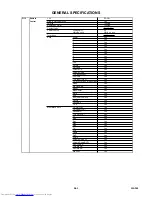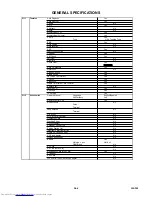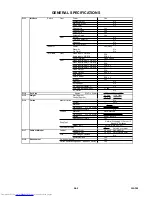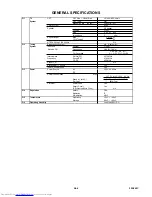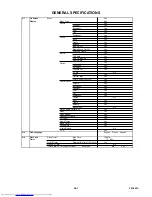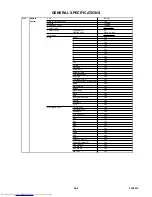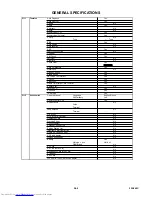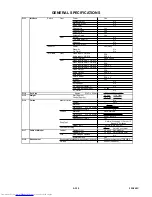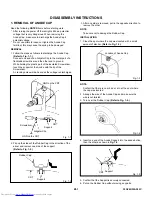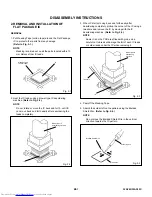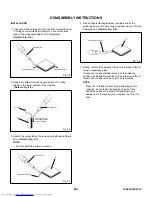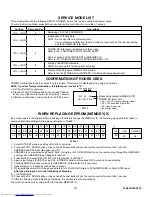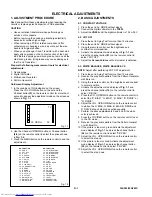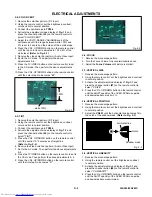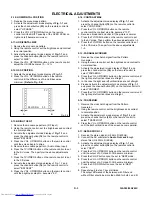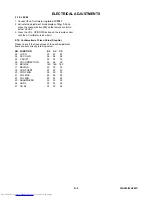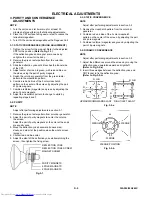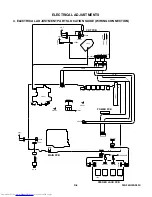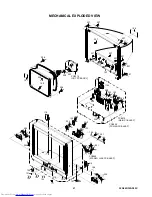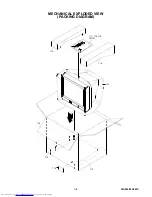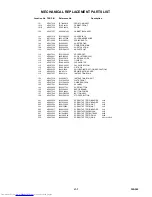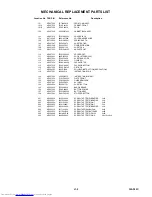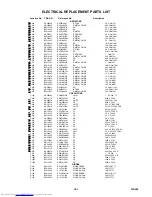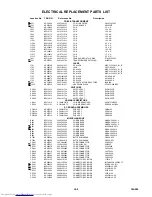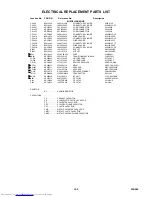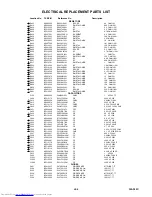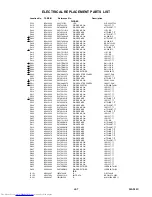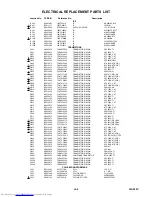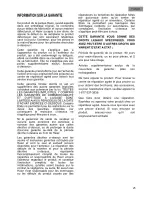
ELECTRICAL ADJUSTMENTS
D-3
32AF45/32AF45C
2-10: HORIZONTAL POSITION
1.
2.
3.
Receive the monoscope pattern.
Activate the adjustment mode display of Fig. 1-1 and
press the channel button (03) on the remote control to
select "H.PHASE".
Press the VOL. UP/DOWN button on the remote
control until the SHIFT quantity of the OVER SCAN on
right and left becomes minimum.
2-15: PARABOLA/CORNER
1.
2.
3.
4.
5.
6.
7.
Receive the cross hatch signal from the Pattern
Generator.
Using the remote control, set the brightness and contrast to
normal position.
Activate the adjustment mode display of Fig. 1-1 and
press the channel button (30) on the remote control to
select “PARABOLA”.
Press the VOL. UP/DOWN button on the remote control until
the right and left vertical lines are straight.
In the case the right and left vertical lines are not straight.
Please Activate the adjustment mode display of Fig. 1-1
and press the channel button (31) on the remote control to
select “CORNER”.
Press the VOL. UP/DOWN button on the remote control until
the right and left vertical lines are straight.
2-16: TRAPEZIUM
1.
2.
3.
4.
Receive the cross hatch signal from the Pattern
Generator.
Using the remote control, set the brightness and contrast
to normal position.
Activate the adjustment mode display of Fig. 1-1 and
press the channel button (32) on the remote control to
select “TRAPEZIUM”.
Press the VOL. UP/DOWN button on the remote control
until the both vertical lines of the screen become parallel.
2-17: SEPARATION 1, 2
1.
2.
3.
4.
5.
6.
7.
8.
Receive the stereo signal (L=2KHz, R=400Hz).
Connect the AC voltmeter to Audio Out Jack though
stereo filter (L=400Hz, R=2KHz).
Activate the adjustment mode display of Fig. 1-1 and
press the channel button (34) on the remote control to
select “SEP1”.
Press the VOL. UP/DOWN button on the remote control
until the output of L-CH and R-CH become minimum.
Press the CH UP button once the set to “SEP2 mode.
Press the VOL. UP/DOWN button on the remote control
until the output of L-CH and R-CH become minimum.
Press the CH DOWN button once the set to “SEP1”
mode.
Repeat step 4 to step 7 several times.
The output difference of the between with Filter and
without Filter should be more than 25db for both L and R.
2-14: CONTRAST MAX
1.
2.
3.
4.
5.
Activate the adjustment mode display of Fig. 1-1 and
press the channel button (18) on the remote control to
select “CONT. MAX”.
Press the VOL. UP/DOWN button on the remote
control until the contrast step No. becomes “100”.
Receive a broadcast and check if the picture is normal.
Press the TV/VIDEO button on the remote control to set
to the AV mode. Then perform the above adjustments 1~3.
Press the TV/VIDEO button on the remote control to set
to the CS mode. Then perform the above adjustments
1~3.
2-13: BRIGHT CENT
1.
2.
3.
4.
5.
6.
7.
8.
9.
Receive the monoscope pattern. (RF Input)
Using the remote control, set the brightness and contrast
to normal position.
Activate the adjustment mode display of Fig. 1-1 and
press the channel button (16) on the remote control to
select "BRI CENT".
Press the VOL. UP/DOWN button on the remote control
until the screen begin to shine.
Receive the monoscope pattern. (Audio Video Input)
Press the TV/VIDEO button on the remote control to set
to the AV mode. Then perform the above adjustments
2~4.
Press the TV/VIDEO button on the remote control to set
to the CS mode.
Activate the adjustment mode display of Fig. 1-1 and
press the channel button (16) on the remote control to
select "BRI CENT".
Press the VOL. UP/DOWN button on the remote control
until the brightness step No. becomes "90".
Receive the monoscope pattern.
Using the remote control, set the brightness and contrast
to normal position.
Activate the adjustment mode display of Fig. 1-1 and
press the channel button (06) on the remote control to
select “H. SIZE”.
Press the VOL. UP/DOWN button on the remote control
adjust the H.SIZE becomes 10 ~ 12%.
2-11: HORIZONTAL SIZE
1.
2.
3.
4.
2-12: OSD POSITION
1.
2.
Activate the adjustment mode display of Fig. 1-1.
Press the VOL. UP/DOWN button on the remote
control until the difference of A and B becomes
minimum. (Refer to Fig. 2-4)
B
A
TV
00 OSD H 30
Fig. 2-4

